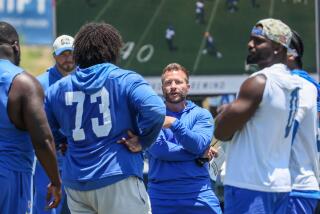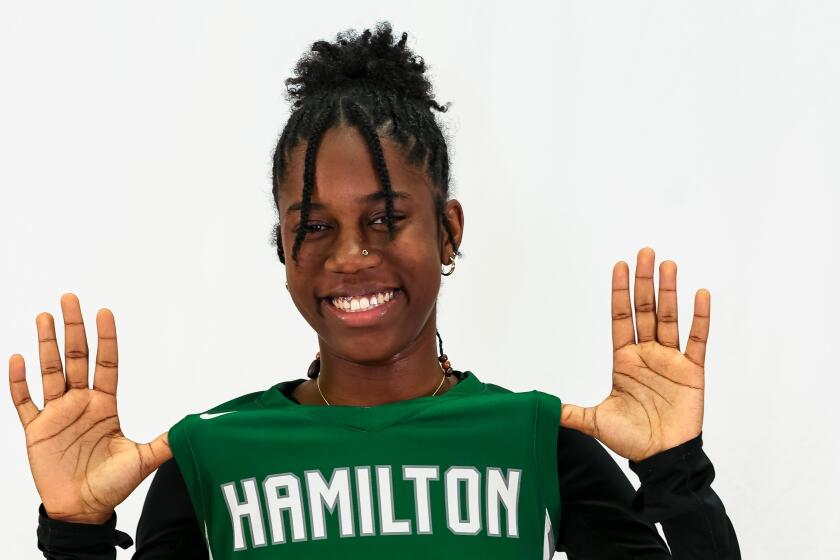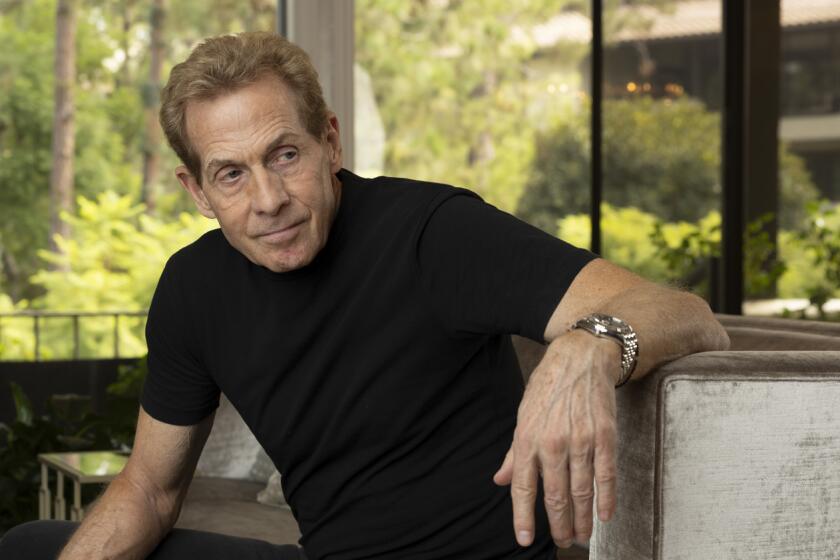THE RAM That Time Forgot
He awakens every morning at 4:30, dresses quietly in a soft sweat suit, steps outside before the sun.
He walks up Hudson, down Olympic, on to the track at Los Angeles High, around and around and around in the dark.
If looking for Ollie Matson these days, this is the best place and time to find him.
A Hall of Fame running back walking invisibly amid us.
A ghost of the Ram football past.
“They act like I’m dead,” he says.
If so, then the 71-year-old rests in a catacombs shared by many, an entire generation of Rams memories left behind six years ago when the team moved to St. Louis.
As football’s quickest, coolest franchise dances toward the threshold of greatness for the second time in three years, its oldest stars slip further into the shadows.
“They don’t even know I exist,” Matson says.
The new Rams have no alumni director. They have had no old-timer reunions. Some of their old stars have never even been invited to St. Louis.
“The connection has been lost,” Matson says.
In Sunday’s Super Bowl against the New England Patriots in New Orleans, most of the sports world thinks the Rams will be playing for their second championship.
Few remember that this would actually be their fourth.
Few still count the 1945 Cleveland Rams’ title or the 1951 Los Angeles Rams’ championship.
Even the Rams’ “Ring of Fame” in St. Louis, the one spot where they still remember the likes of Bob Waterfield and Tom Fears, is not strictly about the Rams.
It also contains the name of three members of the old St. Louis Cardinals.
When asked about their alumni relations, Ram officials directed questions to Harry Thompson, a guard on the 1951 NFL championship team and unofficial alumni liaison.
Yet when reached, Thompson agreed with Matson.
“I think they’ve forgotten about some of the old guys,” he says from his hotel room in New Orleans.
He’s there, but only because he paid his own way.
“It’s the lay of the land,” says Thompson, who still lives in Los Angeles. “The team is not in L.A. anymore, so what happened there has been sort of lost.”
Nowhere is that more profound than with Matson.
Lost, yet he has lived in the same duplex for 42 years.
Lost, yet he has had the same phone number for 42 years.
Lost, yet he was once the most celebrated runner in football, a Marshall Faulk before there was a Marshall Faulk.
“Yeah, I was like him,” Matson says softly during a recent interview in his living room. “Only, I could do more things.”
He still holds the NFL record for most career kickoff returns for touchdowns with six.
He and Jim Thorpe remain the only two Pro Football Hall of Famers with Olympic medals, as Matson won a silver and bronze in track in 1952 in Helsinki.
And, of course, there was the trade.
Marshall Faulk is good, but has he ever been traded for nine players?
Such was the case in 1959, when a Pete Rozelle-engineered transaction brought Matson to the Rams from the Chicago Cardinals.
It remains one of the biggest deals in Los Angeles sports history.
And maybe the worst thing that ever happened to Matson.
“The trade was bad business,” said Mary Matson, Ollie’s wife of 47 years. “It was bad, bad business.”
Her voice pierces the quiet of their home, a comfortably cluttered space with aging football photos on the wall and a replica of his bronze Canton bust on a coffee table.
Mary does most of the talking. Ollie’s memory isn’t what it used to be.
She talks, and he nods. She talks, and he smiles.
“They don’t know about him,” she says.
“They don’t know,” he says.
They say they have never met Ram owner Georgia Frontiere. They say they wince when they hear television people talk as if Ram history was invented by Kurt Warner and refined by Isaac Bruce.
“It’s almost like Ollie doesn’t exist,” she says.
He doesn’t drive anymore, so his appearances at charity golf tournaments have dwindled. He hasn’t done an interview with this newspaper for more than 20 years, so his voice has been lost.
All those sports business stories praising the economic merits of franchise relocation inevitably fail to mention men like this.
The men left behind.
“Nobody has anything against Ollie Matson, he was a great player,” says Bob Oates, a longtime NFL reporter for The Times. “But he just played at the wrong time.”
That was evident as early as 1951, when Matson should have won the Heisman Trophy as a senior at the University of San Francisco, leading the nation in yardage, touchdowns and scoring for an unbeaten and untied team.
Yet with many voters still not accepting of blacks, he finished ninth.
It was the first of many times when he would encounter the sort of athletic racism that some wrongly think began and ended with Jackie Robinson.
“I’ve had to roll with many things in my life,” Matson says.
“If we worried about everything that happened to us, we would be dead,” his wife says.
Returning to California after six good pro years in Chicago, they thought their worries were over.
Until they realized, the Rams didn’t just trade nine players for Matson.
They traded nine white players.
“One black for nine whites? In those days?” recalls Mary. “Lot of people in Los Angeles never got over that.”
They purchased their duplex just six months after they arrived in town. But they had to preview the house after dark.
“People around here were a little more closed-minded back then,” Mary says.
Then once he joined the team, Matson realized that nine-for-one is more than a trade, it’s a target.
“It was no picnic,” he says.
His two Ram coaches, Sid Gillman, then Bob Waterfield, never used him as he had been used in Chicago. There, he had been co-rookie of the year in 1952 and had gained more than 1,000 total yards in three of his six seasons, big numbers for that era.
Some felt the Rams were worried about catering to a star. Others felt there was too much jealousy to overcome.
Whatever, Matson suddenly caught fewer passes and gained fewer yards.
“He never had a shot here,” Mary says. “We were so thrilled to be here, but it never felt right. So much resentment. Dissension right away. The Rams sabotaged themselves.”
Indeed they did, as in Matson’s four years here, they won a total of 11 games.
He was traded to Detroit in 1963, then to Philadelphia for the final three years of his career.
With the children still in school, he retired in Los Angeles, where he has been since.
“Children settle you down,” Mary says.
Their four children are indeed their greatest accomplishment, with their family including a dentist, a banker, a high school coach and a health care worker.
As for Ollie, after football, he bounced around from jobs as a scout, a high school coach, an assistant football coach at San Diego State and a figurehead at the Coliseum.
When all he wanted to do was coach in the NFL.
“But that wasn’t available then,” says his wife. “Lots of things weren’t available.”
Ollie Matson was voted into the Hall of Fame in 1972. He has since been to several reunions there. Always as simply a great football player. Never as a former Ram.
When a Raider makes the Hall of Fame, even one who played there only one season such as Eric Dickerson, he is celebrated in the same manner as Jim Otto or Howie Long.
But in the Ram media guide, on the pages dedicated to their Hall of Famers, Matson doesn’t even rate a biography like 16 other guys. He is given only one line.
“There are times I still ask myself, do I wish I had never been traded from Chicago,” Matson says.
He might return to the spotlight this summer when he’s one of the greats featured in a book by Kristine Clark about the 1951 USF team, titled, “Undefeated, Untied and Uninvited.”
And, oh yes, on Sunday, he will be watching the Super Bowl.
Cheering, of course, for the Rams.
“That’s still my team,” says the old running back, smiling. “They may not know it, but I’m always a Ram.”
*
Bill Plaschke can be reached at [email protected]
More to Read
Go beyond the scoreboard
Get the latest on L.A.'s teams in the daily Sports Report newsletter.
You may occasionally receive promotional content from the Los Angeles Times.











